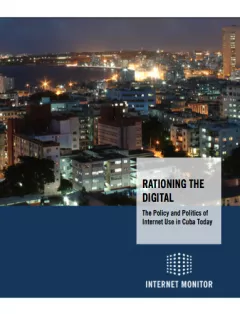
New Internet Monitor report: "Rationing the Digital: The Policy and Politics of Internet Use in Cuba Today"
Internet Monitor is delighted to announce the publication of "Rationing the Digital: The Policy and Politics of Internet Use in Cuba Today", the first in a series of special reports that will focus on key events and new developments in Internet freedom, incorporating technical, legal, social, and political analyses.
"Rationing the Digital," authored by Internet Monitor contributor Ellery Roberts Biddle, explores Cuba's complex economy of Internet connectivity, how digital expression is regulated in the country, and how recent developments in infrastructure might change the shape of access and use on the island:
Cuba has one of the lowest Internet penetration rates in the Western hemisphere and is routinely ranked among countries with the highest restrictions on Internet use in the world. But within both categories, it is something of a rare bird.
While the precise number of Internet users in the country is difficult to calculate, it is clear that a lack of infrastructure, combined with economic and political hurdles, has left access to the global Internet out of reach for most Cubans. But this may soon change. This spring, the country’s only telecommunications firm, the state-owned ETECSA, activated two undersea fiber optic cables that are set to drastically increase connection speeds in Cuba; the firm also opened over 100 cybercafes across the island. Officials have since made public promises to increase access and lower currently exorbitant fees for Internet use. This could fundamentally change the island’s information economy.
The full paper is available for download at SSRN: "Rationing the Digital: The Policy and Politics of Internet Use in Cuba Today"
About Internet Monitor
Internet Monitor is a research project to evaluate, describe, and summarize the means, mechanisms, and extent of Internet content controls and Internet activity around the world. The project will compile and curate data from multiple sources, including primary data collected by the Berkman Center and our partners, as well as relevant secondary data. Internet Monitor will create a freely available online fact base that will give policy makers, digital activists, and user communities an authoritative, independent, and multi-faceted set of quantitative data on the state of the global Internet. The project will also produce annual reports that compile this information and provide expert analysis on the state of the global Internet.
Contact
info@thenetmonitor.org
